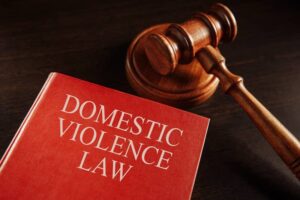Injury to personal property is a legal term that refers to damage or harm done to someone’s belongings. 
ITPP, as it is sometimes called, can be a form of Domestic Violence.
Purposely destroying personal property, particularly in the context of a domestic relationship, may be an attempt to control the victim and can result in emotional distress, bodily injury, and physical harm.
As you might imagine, Domestic Violence can play a major role in family law cases, especially in instances of family violence and physical abuse, such as Assault, Communicating Threats, and related criminal conduct.
Domestic Violence is intentional. The associated laws tend to be intentional in nature.
For example, Assault on a Female is an intentional act committed by an 18-year-old or older male against a female. It’s not accidental.
That’s true also for Injury to Real Property and Communicating threats. Those too are illegal because they are acts intended to cause harm to another person, whether that be physical harm or emotional harm.
To be clear, the court system in Mecklenburg County (and throughout NC) takes allegations of Domestic Violence very seriously.
Domestic Violence affects families in the worst way. The long-term consequences are both well known and tragic – Bill Powers, Charlotte Domestic Violence Lawyer
Judges, Child Protective Services (DSS-CPS), and Divorce Lawyers in Charlotte all pay close attention to instances of violence between domestic partners, household members, and particularly minor children.
In this article, we will discuss what is “injury to personal property” and how it may be relevant to your family law matter, whether that includes separation, divorce, child custody, child support, or visitation.
What is Domestic Violence?
Domestic violence is often a pattern of abusive behavior in which one intimate partner seeks to gain or maintain power and control over the other.
Abusive behaviors can include physical injury, sexual assault, emotional or verbal abuse, economic control, and psychological abuse. 
Domestic Violence may also include threats of physical abuse or imminent physical harm between domestic partners or those in a dating relationship or in some sort of intimate relationship.
It is important to remember that domestic violence does not always involve physical violence.
Emotional, economic, and psychological abuse can be just as damaging, if not more so, than physical harm to personal items.
Furthermore, the parties need not be married or be family members who live together.
The NC Domestic Violence laws apply to a wide range of different types of dating and family relationships and generally thought of as inclusive or expansive in nature.
The purpose of such laws is to protect victims and prevent further acts of domestic violence.
What is Injury to Personal Property?
Injury to personal property is intentional damage or harm done to someone’s belongings. 
This ordinarily involves physical damage, such as breaking or destroying items within a household or in the possession of the victim.
That may include things such as:
- Cell Phones
- Pictures, Notes, and Cards
- Jewelry, Gifts, and Items of Sentimental Value
- Scratches and Damage to Vehicles
Injury to personal property can be a form of domestic violence and, in certain circumstances, can have a significant impact on family law cases.
Indeed, damage to personal items may be the first step in a pattern of escalating forms of Domestic Violence and attempts to control another person.
All too often we see the intentional destruction of personal property in family court. Whether it comes from evidence presented by a police officer or the victim in the court process, ITPP is a common precursor to imminent physical harm – Bill Powers, Charlotte Child Custody Lawyer
If you have been the victim of injury to personal property or another form of Domestic Violence, we think it is important to speak with an experienced attorney who can help you protect yourself from additional acts of DV and physical harm.
Why is Domestic Violence relevant to Family Court?
In family court, the term “domestic violence” generally refers to physical violence or threats of violence against a spouse, intimate partner, or that involves a past intimate relationship, dating relationship, child, or another family member. 
Domestic violence can also include emotional abuse, economic abuse, and controlling behaviors.
If you have been a victim of domestic violence, you may have questions such as:
- What type of lawyer do I need?
- How will DV affect my family law case?
- Does Domestic Violence play a role in Child Support and Child Custody of minor children?
- Will a Domestic Violence call to the police or 911 result in criminal charges?
- What is Communicating Threats?
- Will Domestic Violence charges require a court appearance or testimony on the court date?
- Can Domestic Violence involve a Dating Relationship or only household members?
- Can I get protection in the form of a Court Order from a prior intimate relationship or prior marriage, even if we don’t live together or have children in common?
In North Carolina, there are several statutes that deal with injury to personal property and domestic violence.
Injury to personal property is the intentional damage to or destruction, or removal of tangible personal property of the victim.
North Carolina General Statute 50B, explains what is domestic violence, generally setting forth it involves::
- Causing or attempting to cause serious bodily injury, N.C.G.S. ASSAULTS, or bodily injury
- Placing the victim or a member of the victim’s household or family in fear of an assault or serious bodily injury
- Acts upon a minor child who resides with the victim or who is the custody of the victim
- Acts upon the victim or the victim’s family
If you have been a victim of domestic violence and there has been some type of injury to your personal property, you may be able to use this statute to seek protection in family court.
Why is a Smashed Cell Phone Relevant in Domestic Violence Cases?
A smashed cell phone may be relevant in a domestic violence case for a few different reasons. 
While it may not be immediately obvious to some, a smashed cell phone is often a form of control over the victim.
It prevents access to friends and family.
It prevents access to help and protection from law enforcement in the event of an emergency.
It also literally prevents victims of Domestic Violence from calling 911 and reporting a crime.
Our cell phones are imperative to our daily lives. All our personal information is in there, including school and work schedules and contact information. Without your cell phone, you may have almost no ability to communicate with others – Bill Powers, Charlotte Domestic Abuse Attorney
Furthermore, cell phones also regularly contain evidence.
Evidence in domestic violence cases, both in civil and criminal court, can involve pictures and video evidence.
It may also involve recordings of conversations, texts, email messages, social media posts, and a log of phone call dates and times.
For example, if the police are called to the scene of a domestic dispute, they will sometimes ask to see the victim’s cell phone for specific proof of a domestic violence incident that took place in the household or as part of an intimate relationship.
The victim may have text messages or voicemails from the abuser that can be used as evidence of domestic violence in both civil court and criminal court.
A smashed cell phone may be relevant if the victim is trying to obtain a domestic violence protective order (DVPO), given the Court often considers evidence of Acts of Domestic Violence, which may include things like:
- Specific instances of conduct and/or a pattern of injury to personal property
- Allegations of Assault, whether it be Simple Assault, Assault on a Female, Assault with a Deadly Weapon, or Assault on a Child associated with an intimate relationship or family or household dynamic
The victim may be able to use the smashed cell phone as evidence of injury to personal property.
If the victim is able to show that the abuser intentionally destroyed their cell phone, the victim may be able to obtain a domestic violence protective order.
If you have been a victim of domestic violence and you are involved in a family law case, we belive it is important to speak with an experienced attorney who can help you navigate the legal system and protect your rights.
An attorney can help you understand the process and explain how things work.
We recommend you call now to schedule a confidential consultation.
What you tell us is subject to attorney-client privilege.
What is a Domestic Violence Protective Order?
A Domestic Violence Protective Order (DVPO) is a court order that can provide protection for victims of domestic violence. 
A DVPO can do things like:
- Order the abuser to stay away from you, your children, your home, and your workplace
- Order the abuser to not contact you or your family
- Prohibit the abuser from possessing a gun
- Grant you temporary custody of your children
- Order the abuser to pay child support
If you are involved in a family law case, and you are also a victim of domestic violence, it is a good idea to speak with an experienced attorney who can help you navigate the legal system and protect your rights.
At the Powers Law Firm, we understand how difficult it can be to deal with both a family law case and domestic violence.
We are here to help.
Contact us today for a consultation.
Domestic violence is a serious issue that can have lasting effects on victims and their families. If you or someone you know is a victim of domestic violence, there are resources available to help – Charlotte Divorce Lawyer Bill Powers
The National Domestic Violence Hotline provides 24/hour support for victims of domestic violence. You can call them at 800-799-SAFE (800-799-7323).
If you are in immediate danger, please call 911.
What is a “50B” in North Carolina and is that the same thing as a DVPO – Domestic Violence Protective Order?
A 50B is a civil domestic violence protective order. Sometimes people call it a Restraining Order.
Lawyers may also refer to a DV Protective Order as a “50B” because that is the law in North Carolina that defines what is Domestic Violence and further sets forth the process of seeking protection for what are known as “acts of domestic violence.”
NC Domestic Violence Law: North Carolina General Statute Chapter 50B.
Are Family Law and Domestic Violence Cases in North Carolina Handled in Criminal Court or Civil Family Court?
Domestic violence cases in North Carolina can be handled both in the civil, family courts, and criminal court, obviously depending on the facts and circumstances of the individual matter.
Acts of domestic abuse, whether or not it results in physical injury, may be subject to criminal prosecution under the law.
Mecklenburg County, there two courtrooms ordinarily devoted to domestic violence cases. The courthouse is located in Charlotte.
Matters that take place Mecklenburg County, whether that be in the City of Charlotte, Pineville, Matthews, Davidson, Cornelius, or Huntersville are handled in the 26th Judicial District, which represents Mecklenburg County.
Courtroom 4110 is one of the primary courtrooms for hearing civil, 50B – DVPO Domestic Violence Protective Orders.
In the civil setting, the Court (the District Court Judge) may, in addition to issuing an Order of Protection, address issues such as child custody, child support, and living arrangements.
In a subsequent action under N.C.G.S Chapter 50 – Article 1 – Divorce, Alimony, and Child Support, Generally, the Family Court Judge may again address issues involving child custody and child support on a more permanent basis.
Each case is different.
As such, the manner in which the Court proceeds is guided both by the individual aspects and fact pattern of the case, together with the NC Family Laws and Criminal Laws relevant to the proceeding(s).
Courtroom 4130 in Charlotte is a criminal setting for criminal Domestic Violence cases including charges such as:
- Assault on a Female, Simple Assault
- Communicating Threats
- Injury to Personal Property
- Injury to Real Property
- Assault with a Deadly Weapon
- Interference with Emergency Communications
Domestic Violence may also be considered by a Family Court Judge in determining issues involving Ordering post-separation support, child custody, and child visitation.
A substantial number of Chapter 50 actions are handled on the 8th Floor of the Mecklenburg County Courthouse.
Frankly, it all can be a bit confusing trying to figure out how the court system works in Charlotte.
That’s why we think it’s a good idea to seek legal help from an attorney with substantial experience with domestic abuse issues in both Family Court and Criminal Court.
What is Injury to Personal Property in the context of Domestic Violence in Criminal Court?
It is a crime under North Carolina law to intentionally injure the personal property of another person.
The statute that defines the offense of injury to personal property is found in North Carolina General Statute 14-160.
The crime of injury to personal property is ordinarily a misdemeanor offense. The level of the misdemeanor depends on the value of the item or items that are destroyed.
The punishment for a conviction of injury to personal property can range from a fine to imprisonment depending on the value of the damage done and whether the defendant has any prior convictions.
Is Sexual Assault Domestic Violence?
The answer to this question is most certainly, Yes.
Sexual assault is a serious crime that can have lifelong consequences for the victim. In certain circumstances, it may result in felony criminal charges.
In North Carolina, sexual assault is defined as any nonconsensual sexual contact accomplished by force, intimidation, or coercion, or when the victim is mentally incapacitated or physically helpless, or unable to give consent.
Sexual assault is a form of domestic violence and can be prosecuted under both state criminal laws and may serve as a legal basis for the issuance of a Domestic Violence Protective Order.
Clearly, sexual assault and physical harm against a family member can affect child custody and child support issues.
Powers Law Firm – Charlotte Domestic Violence Lawyers
Our Charlotte, North Carolina lawyers have substantial experience handling domestic violence cases in both the Family Courts and Criminal Courts.
Contact us today to scheudle a consultation to discuss your particular facts and circumstances as well as to learn more about how our experience may help you.